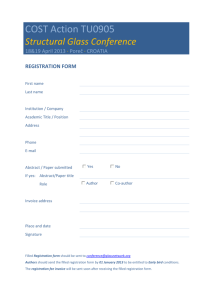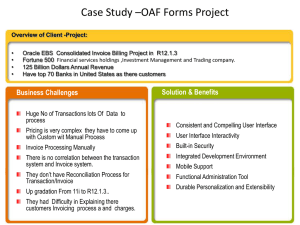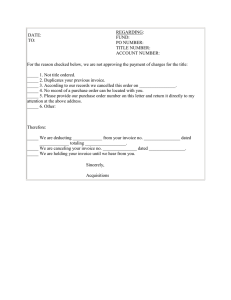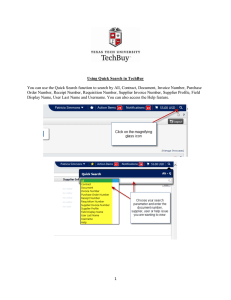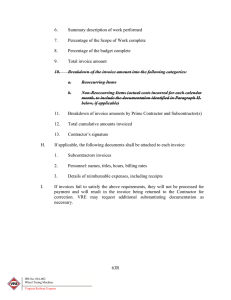Billing, Collection and Write Off Policy for Non-Student 05.104
advertisement
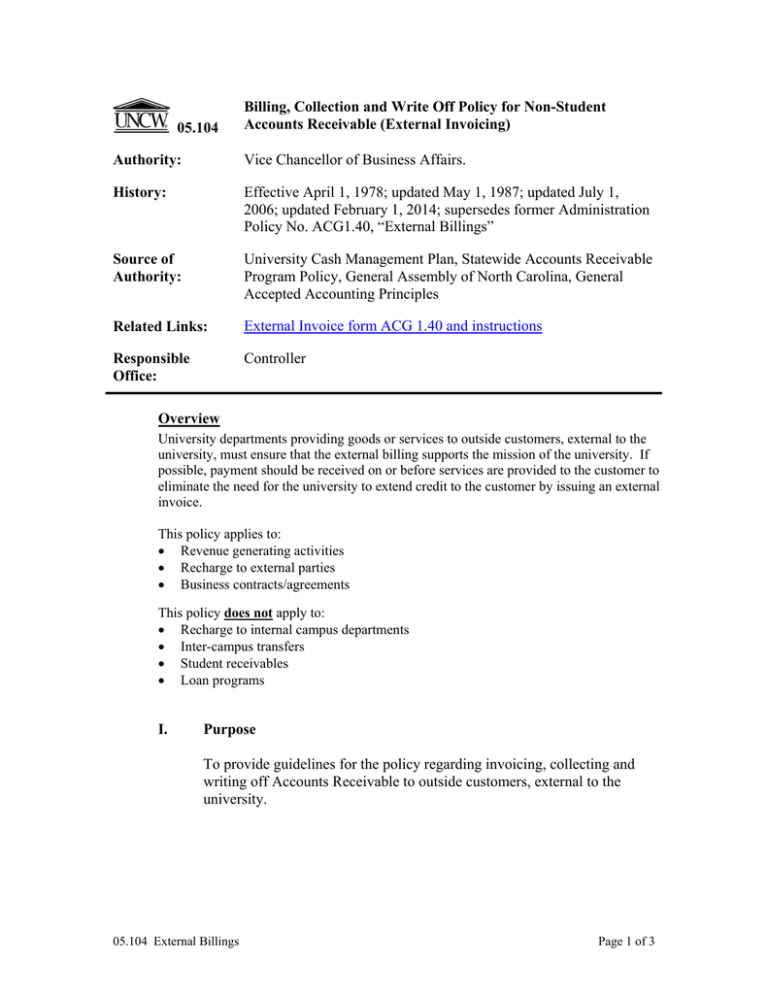
05.104 Billing, Collection and Write Off Policy for Non-Student Accounts Receivable (External Invoicing) Authority: Vice Chancellor of Business Affairs. History: Effective April 1, 1978; updated May 1, 1987; updated July 1, 2006; updated February 1, 2014; supersedes former Administration Policy No. ACG1.40, “External Billings” Source of Authority: University Cash Management Plan, Statewide Accounts Receivable Program Policy, General Assembly of North Carolina, General Accepted Accounting Principles Related Links: External Invoice form ACG 1.40 and instructions Responsible Office: Controller Overview University departments providing goods or services to outside customers, external to the university, must ensure that the external billing supports the mission of the university. If possible, payment should be received on or before services are provided to the customer to eliminate the need for the university to extend credit to the customer by issuing an external invoice. This policy applies to: Revenue generating activities Recharge to external parties Business contracts/agreements This policy does not apply to: Recharge to internal campus departments Inter-campus transfers Student receivables Loan programs I. Purpose To provide guidelines for the policy regarding invoicing, collecting and writing off Accounts Receivable to outside customers, external to the university. 05.104 External Billings Page 1 of 3 II. Scope This policy applies to all university departments who extend credit via invoicing to outside customers, external to the university, upon the delivery of goods or services. III. Policy A. Billing: A receivable obligation is established immediately upon delivery of a good or service for which payment has not yet been received. This receivable is an asset to the university and must be reflected accurately and timely in the university’s financial records. 1. Prior to providing the goods or services, university departments are expected to: Ensure that the customer does not have an outstanding debt to the university Retain supporting documentation to substantiate the charge Secure sufficient documentation in order to enforce collections (customer’s Form W-9) Obtain accurate customer billing addresses (both email and mailing addresses) Inform customer of university billing and payment terms, conditions and protocols Communicate the terms and conditions of the purchase to the customer (e.g., price, exchanges, refunds, consequences of failure to pay) 2. The official UNCW invoice (External Invoice form ACG 1.40) must be used for all outside customer billing. Any modifications to the External Invoice form must be approved by the Controller’s Office before invoicing, including payment terms. 3. The Budget Authority’s approval is implicit in his/her submission of each invoice and/or invoice adjustment to the university’s centralized Billing Department for processing. 4. Payment Handling Practices: All customer payments must be received via US mail or hand-carried to the university’s Controller’s Office for deposit. All payments must be deposited by the Controller’s Office. B. Collection of Past Due Invoices 1. If an invoice is not paid within the invoice terms, it is considered delinquent. The university department is expected to communicate with the customer, whenever possible, to avoid delinquent invoices. 2. When an invoice becomes 1-30 days past due, the Controller’s Office sends a past due invoice to the customer and makes a subsequent telephone call to the customer. 05.104 External Billings Page 2 of 3 3. When an invoice becomes 31-60 days past due, the Controller’s Office sends the customer a dunning (collection) letter. 4. When an invoice becomes 61-90 days past due, the Controller’s Office sends a customer statement to the customer that includes interest and penalty charges as mandated by G.S.147-86.23. If payment is not received within five days of sending the customer statement, the invoice with all backup is submitted to the university’s Collection Department for further collection efforts: Set-Off Debt Collection Act (SODCA), submission to the NC Office of Attorney General (OAG) and submission to collection agencies. Interest will continue to accrue each month until the invoice is paid or written off. C. Write off of Past Due Invoices: 1. All uncollectible invoices are charged back to the issuing department’s write off account. 2. Past due amounts of $50 or more are reported to the OAG by the university’s Collection Department (see B.4). If the past due amount is less than $50, additional collection efforts are not required as the Controller’s Office makes the appropriate determination for write off. 3. The university’s Collection Department submits the delinquent account of $50 or more to the Controller’s Office for write off after the following collection activities have been exhausted: Referral to the Office of Attorney General Processed for collection through SODCA for one processing cycle Referral to Office of State Budget and Management (OSBM) for identification of debt owed by state employees Referral to two collection agencies with no activity on the account for twelve months 4. For any uncollectible receivable of $50 or more that has been written off, a summary level record of the account (sufficient to substantiate the debt) is to be retained indefinitely or until the debt has been collected or discharged by the Billing Department. For any uncollectible receivable less than $50 that has been written off, such record must be retained by the Billing Department for two years. 05.104 External Billings Page 3 of 3

